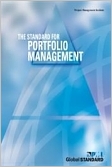| |||||
• polskie
• Zamów informacje o nowościach z wybranego tematu • kontakt |
STANDARD FOR PORTFOLIO MANAGEMENTwydawnictwo: PMI, 2006, wydanie I cena netto: In parallel to the growing acceptance and utilization of the profession of project management, the discipline of portfolio management is gaining favor as a means of helping organizations focus not only on "doing work right," but also on "doing the right work." Yet across all industry sectors, project management practitioners have operated without a documented set of processes that represent generally recognized good practices in portfolio management. Now, with Project Management Institute's (PMI) introduction of The Standard for Portfolio Management, portfolio managers have a resource to help them develop professionally and achieve success for themselves and their Organizations. Within an organization, a portfolio represents a collection of active programs, projects and other work undertaken at a specific point in time to help the organization reach strategic objectives. In essence, a portfolio reflects the priorities, investments and resource allocations. Portfolio management, therefore, is the centralized management of one or more portfolios in order to achieve specific strategic business objectives. As a process, portfolio management enables organizations to identify, categorize, evaluate, select, prioritize, authorize, terminate and review various portfolio components to ensure their alignment with current and future business strategy and goals, which in turn helps organization optimize limited resources. Because portfolios address all aspects of an organization, reaching into organizational functions such as finance, marketing, corporate communications and human resources, as well as strategic objectives, portfolio management has become a key method used to create and execute effective corporate governance frameworks. With this in mind, The Standard for Portfolio Management is designed to provide a guide to those processes generally recognized as good practices in portfolio management and focuses on portfolio management as it relates to the disciplines of program and project management. The Standard is an expansion on A Guide to the Project Management Body of Knowledge (PMBOK Guide) - Third Edition and the Organizational Project Management Maturity Model (OPM3), and provides portfolio managers with the same quality of knowledge and practices outlined for project managers in the PMBOK Guide. 79 pages, A4, paperback Księgarnia nie działa. Nie odpowiadamy na pytania i nie realizujemy zamówien. Do odwolania !. |


